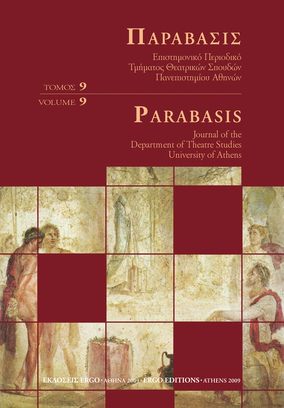Οι τύχες της θεατρικής ορολογίας της αρχαιότητας στην ελληνική παράδοση
Part of : Παράβασις : επιστημονικό περιοδικό Τμήματος Θεατρικών Σπουδών Πανεπιστημίου Αθηνών ; Vol.7, No.1, 2006, pages 209-238
Issue:
Pages:
209-238
Parallel Title:
The fortune of the terminology of ancient theatre in greek tradition
Section Title:
Μελέτες και άρθρα
Author:
Abstract:
This article provides an overview of the Greek theatre terminology of the antiquity in the Greek tradition after antiquity, giving emphasis to the hellenistic and byzantine use of words like “drama” and theatre” in different contexts and with different meanings, the first part of the article analyses the semantic changes in the light of Christendom, where the ancient hypokrites becomes just a hypocrit, mime is a Her, theatre is something ridiculous and drama means just something dramatic. In the Byzantine world without organised theatre and without the literary genre of drama, the theatre terminology can be traced in other literary genres, as in romance or rhetoric. The second part is dedicated to the idea of the world as a theatre or drama, an idea elaborated mainly by Plotin and Epictet, but also very well known in patrology and by the Church Fathers. The ecclesiastic use culminates in the writings of Theodoros Metochites in the 14th century, some time before the systematic use of the idea in western Renaissance and Baroque literature (Shakespeare, Lope de Vega etc). The third part of the article is dedicated to the use of the theatre terminology in Greek pre-revolutionary drama: Cretan, Heptanesian and Aegean dramaturgy, together with the drama production of the 18th and early 19th century. In the 19th century the Greek terminology of drama and theatre gains again its original meanings: theatre is again theatre, and drama is what it was in antiquity
Subject (LC):
Keywords:
αρχαίο ελληνικό δράμα




